Adil Najam
Reading Pakistani newspapers is not recommended for the weak of heart.
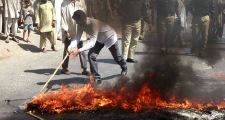
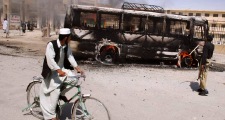
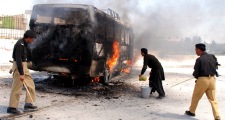
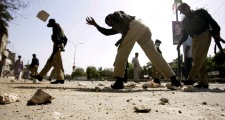
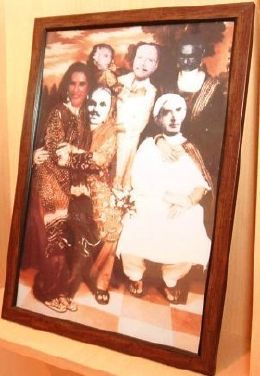 Open yours today, and here is what you find:
Open yours today, and here is what you find:
In Quetta riots have broken out and at least one is dead after the murder of Baluch nationalist leaders. The violence has also Karachi for the same reason and made a city already tense over the silly violence about an artwork at the Shanakht Festival even worse. Meanwhile, in Islamabad, the city has been placed on alert and security intensified after a request from foreign organizations. I stopped reading at this point knowing that Swat is already lost and FATA burns every day and things elsewhere are not hunky dorry either.
The situation in Balochistan has been bad for a while and just took a turn for the worse. According to a story in Dawn:
A police constable was killed and at least 12 other people were injured in firing on Thursday as Balochistan slid into violence after the bodies of three Baloch nationalist leaders were found in Turbat. The decomposed bodies of Baloch National Movement (BNM) chairman Ghulam Mohammad Baloch, Lala Muneer Baloch and Sher Mohammad Baloch of the Baloch Republican Party (BRP) were found in Pedarak, near Turbat, late on Wednesday night.
Kachkol Ali, an advocate and former leader of the opposition in the Balochistan assembly, had alleged at a press conference four days back that the three leaders had been whisked away by security officials from his chamber on April 3. They had gone to the court to attend the hearing of a case against them. Baloch political groups and bar associations gave a call for a general strike on Friday and Saturday and a wheel-jam strike on Sunday to condemn the killings. Lawyers will boycott courts till Saturday. Nationalist parties also announced seven-day mourning in Balochistan and other parts of the country. Police took the bodies to Turbat after receiving information about them. ‘The bodies appear to be four to five days old,’ a police official said.
Political workers, students and supporters of nationalist parties took to the streets early in the morning in Quetta, Khuzdar, Kharan, Nushki, Turbat, Mand, Panjgur, Gwadar, Kalat, Mastung and Dera Murad Jamali. A complete strike was observed in the towns. The Balochistan University and all other educational institutions were closed till Sunday. Protesters blocked the Sariab and Brewery roads in the provincial capital by setting tyres on fire and erecting barricades. They also pelted vehicles with stones and attacked several buildings. A pick-up of the United Nations was set on fire on Sariab Road, so was a bus of the Women’s University on Brewery Road and a car in front of the Civil Hospital.
Students of the Balochistan University blocked a road and set afire a bus of a government department. Protesters also torched a branch of Askari Bank in Hazar Gangi and attacked other banks on Sariab Road. A mob smashed windowpanes of several buildings on Brewery Road. Police and Balochistan Constabulary personnel used tear gas to disperse the protesters. An exchange of fire between police and the protesters occurred near Sariab. Police arrested over a dozen people. Armed men attacked a police van with a hand grenade near a bypass in Quetta, injuring three policemen. A group of people broke window panes of an office of the Water and Power Development Authority in Sheikh Manda. A man was inured in a grenade attack on his house in Killi Bangulzai.
In Karachi, tension gripped the Baloch-dominated areas when demonstrators blocked traffic, resorted to firing into the air and burned tyres in protest against the killing. Condemning the killing, Karachi-based Baloch nationalist leaders called for shutterdown strikes in all Baloch-populated areas on April 10 and 11, and a wheeljam strike on April 12. Baloch National Party-Mengal (BNP-M) leader Sardar Akhtar Mengal alleged at a press conference that intelligence agencies were responsible for the killing.
In Khuzdar, constable Ahmed Khan Zehri was shot dead in Civil Colony while he was going to a police station. Protesters clashed with police in different parts of the town and two people were reported to have been injured in an exchange of fire. A blast also rocked the town. The administration called out the Frontier Corps. ‘FC troops have been deployed at important buildings and places,’ said Wahid Shahwani, a resident of Khuzdar. The demonstrators blocked the highway linking Quetta with Karachi at different points in Khuzdar district, suspending traffic between Sindh and Balochistan. A doctor was shot in Ghazgi area of Mastung.
In Mand, a mob set a police station on fire after ransacking it. Branches of several banks were also set ablaze and vehicles were pelted with stones. FC personnel were deployed in the town. In Panjgur, a mob attacked offices of the Pakistan People’s Party and the Balochistan National Party-A and government buildings. The PPP office was destroyed. A mob damaged several shops in Gwadar Bazaar. Police foiled an attempt to set the shops on fire. Law enforcement personnel stopped a mob from entering the port. In Hub, five people were injured in a grenade attack near a mosque.
Police arrested over three dozen workers of the Baloch Students’ Organisation (BSO) and political parties during demonstrations. The BSO leaders said law enforcement agencies’ personnel baton-charged women of the Baloch Penal to stop them from taking out a procession. Shakar Bibi advocate, who was leading the procession, was injured. Police and FC contingents started patrolling Quetta and adjacent areas in the night. Ghulam Mohammad and Sher Mohammad were buried in their native town Mand and Lala Muneer in Chitkan village, near Panjgur. Thousands of people attended the funerals. The bodies had been handed over to their relatives after legal formalities. According to sources, they bore torture marks and bullet wounds.
Not surprisingly, this issue has also made Karachi tense. But, then, Karachi was already tense. And for the silliest of reasons this time. An artwork showing various Pakistani politicians and making the point that even elected ones were “nurtured” by military dictators so enraged PPP workers (because of the way Benazir Bhutto was depicted) that violence erupted at the Shanaakht Festival 2009, resulting in the Festivals closure. The picture itself is included at the top of this post. One can quibble with its taste or with the fact that it includes some politicians and not others (e.g., Gen. Pervez Musharraf and Altaf Hussain are both missing). But bad art, even if this is that, is never a reason for violence. This swpeaks to deeper currents of intolerance in our society. The editorial in Dawn gets its exactly right:
It may come in various forms — extremism, political idolatry etc — but the real culprit remains the culture of intolerance that is virtually bringing regular life to a grinding halt. One hopes that the mayhem on the opening day of Karachi’s Shanaakht Festival 2009 over a piece of art that displayed Zulfikar and Benazir Bhutto in the same frame as Gen Zia is not a harbinger of suppressive times ahead.
The fact that the violence was perpetrated apparently by PPP supporters is indicative of a philosophy of insularity within the ranks of a party that has long extolled the virtues of democracy and secularism. Party leaders have defended the incident as an emotional response to the refusal of the organisers to remove the ‘objectionable’ picture.
Although the Sindh information minister visited the ravaged site of the festival and ordered an inquiry, she should have steered clear of seeking refuge in excuses such as inefficient security deployment at the venue, and use the television footage to bring those responsible to justice. Having paid in blood to restore democracy, the PPP is obligated to adhere to democratic ideals which include freedom of expression.
Perhaps, there is no better time than now to evaluate this convenient excuse of emotionalism, for this is also what propels extremists to blacken models on billboards and Baloch leaders to defend archaic customs. Moreover, if endeavours that promote expression have to depend on heavy security to see them through, then regardless of the current democratic clime, the nation has not shed Zia’s shackles.
It is lamentable that dissent should be synonymous with violence; the same political workers could have registered an FIR, used the media to voice their objections and approached the ministry of culture to take action. Authorities and political parties must encourage pluralism and create an environment that tolerates all shades of opinion.
Prejudice is our real enemy; when faith is out of the picture, other ‘ideals’ take its place to suppress expression. The only way out is for the present dispensation to lead by example and ensure accountability for wrongdoers, including overwhelmed party supporters.
And, finally, you have this in The News about Islamabad on high alert:
Interior Advisor Rehman Malik Friday said the security in Islamabad has been stepped up further on foreign organizations’ asking. Speaking here he said the foreign organizations had requested for beefing up security at their offices and in response the government has deployment extra security personnel there. He was of the view that the private schools face no security threat and asked the owners of schools to reopen them. If they still have any reservation with regard to security steps, they can contact Commissioner Islamabad, he added. Rehman Malik informed that the US consulates were closed for a single day to check security arrangements.
I, for one, cannot yet make sense of this. There is obviously more behind this. But What?
So, what is going wrong here. Everything I guess. The “perfect storm” is now daily routine in Pakistan!


















































Dear Adnan,
They were surely PPP supporters, but no one in the Party condoned this behavior infact all came to do damage control. And offered to carry on with the show. Have you seen such tolerance in any other party? Oh whom am I asking an obvious question?
Inshallah all will get well, Ameen.